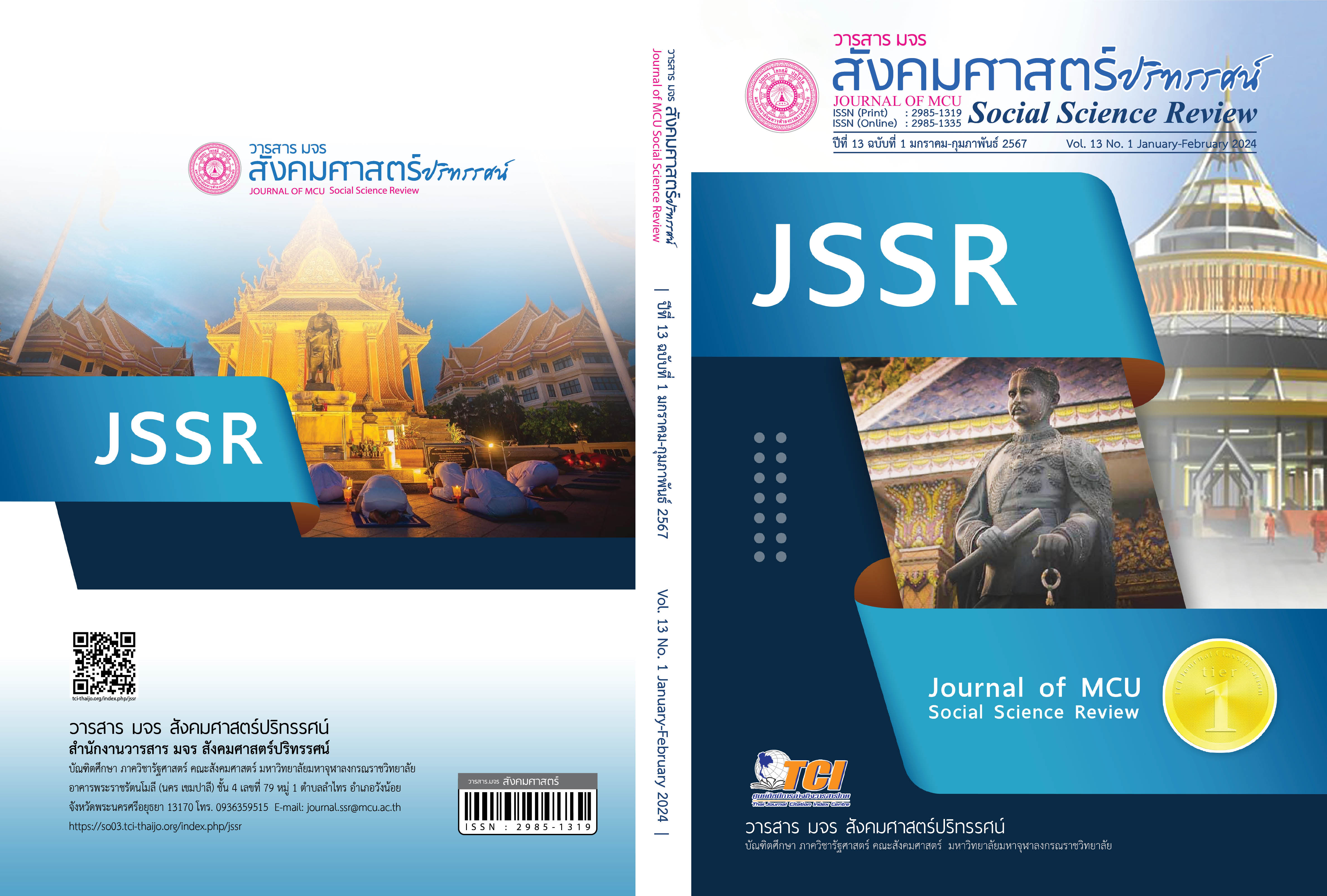SOCIAL CAPITAL AND QUALITY OF LIFE OF THE CARER OF DEPENDENT ELDERLY
Keywords:
The Carer, Social Capital, Quality of LifeAbstract
Objectives of this research article were to study the relationship between social capital and quality of life of the carer of the dependent elderly. This study divided the social capital into 3 components which were trust, norm reciprocity and social network support. The data were collected from 386 samples who were in the health region 2 included 5 provinces: Sukhothai, Phitsanulok, Tak, Uttaradit, and Phetchabu, conducted by the quantitative research. The research tool was questionnaires and data were analyzed by average, percentage and multiple regression analysis: MRA. The findings were social capital relates to quality of life with reliability at 0.05 and the factors which have positive influence with quality of life are social network support (beta=0.730) and trust (beta=0.444). On the other hand, norm reciprocity does not relate to quality of life.
From the research, there were 2 suggestions included: 1. Government and related organizations should support the public policies which can promote the social network support in social capital by establishing the social network, cooperation and interaction on the basis of changing knowledge and resources between people and 2. Government and related organizations should support the carer’s trust in both informal relationship such as family members, neighbors in community and formal relationship such as public health professionals.
References
กิตติวงค์ สาสวด. (2560). ปัจจัยที่ส่งผลต่อคุณภาพชีวิตผู้สูงอายุในจังหวัดภาคตะวันออก. วารสารชุมชนวิจัย, 11(2), 21-38.
จิรนันท์ ปุริมาตย์ และคณะ. (2562). ปัจจัยที่มีอิทธิพลต่อคุณภาพชีวิตของผู้ดูแลผู้สูงอายุที่มีภาวะพึ่งพิงในจังหวัดจันทบุรี. วารสารวิชาการสาธารณสุข, 28(4), 610-619.
ชวลิต สวัสดิ์ผล และคณะ. (2560). การดูแลผู้สูงอายุที่อยู่ในภาวะพึ่งพิงในพื้นที่ภาคตะวันออกเฉียงเหนือของไทย. วารสารสันติศึกษาปริทรรศน์ มจร, 5(พิเศษ), 387-405.
พัชรี ตันติวิภาวิน. (2555). การก้าวสู่ประชาคมเศรษฐกิจอาเซียนกับการเสริมพลังผู้สูงอายุไทยให้เป็นพลังทางเศรษฐกิจและสังคม. วารสารร่มพฤกษ์ มหาวิทยาลัยเกริก, 30(3), 53-70.
มูลนิธิสถาบันวิจัยและพัฒนาผู้สูงอายุไทย. (2562). สถานการณ์ผู้สูงอายุไทย พ.ศ.2561. กรุงเทพฯ: บริษัท อมรินทร์พริ้นติ้ง แอนด์พับลิชชิ่ง จำกัด (มหาชน).
_____. (2564). สถานการณ์ผู้สูงอายุไทย พ.ศ. 2563. กรุงเทพฯ: บริษัท อมรินทร์พริ้นติ้ง แอนด์พับลิชชิ่ง จำกัด (มหาชน).
ลดาวัลย์ ประทีปชัยกูร และคณะ. (2555). คุณภาพชีวิต ความคงอยู่และการสนบสนับสนุนทางสังคมของพยาบาลวิชาชีพในพื้นที่ที่มีความไม่สงบของสามจังหวัดชายแดนภาคใต้ (รายงานการวิจัย). กรุงเทพฯ: สำนักงานเลขาธิการวุฒิสภา.
วินัย อ่ำดวง. (2553). คุณภาพชีวิตของประชาชนชาวชุมชนสะพานสาม ตำบลท้ายบ้าน อำเภอเมืองสมุทรปราการ จังหวัดสมุทรปราการ. วารสารสารสนเทศ, 11(2), 70-75.
ศิราณี ศรีหาภาค และคณะ (2557). รายงานผลการวิจัยเรื่องผลกระทบและภาระการดูแลผู้สูงอายุระยะยาวภายใต้วัฒนธรรมไทย. สืบค้น 22 สิงหาคม 2566, จาก http://digital.nlt.go.th/items/show/8498
สำนักงานหลักประกันสุขภาพแห่งชาติ. (2559). คู่มือสนับสนุนการบริหารจัดการระบบบริการดูแลระยะยาวด้านสาธารณสุขสำหรับผู้สูงอายุที่มีภาวะพึ่งพิงในระบบหลักประกันสุขภาพแห่งชาติ. กรุงเทพฯ: สำนักงานหลักประกันสุขภาพแห่งชาติ.
สำนักอนามัยผู้สูงอายุ. (2563). รายงานจำนวนผู้ที่มีภาวะพึ่งพิงรายหน่วยบริการ. สืบค้น
มีนาคม 2563, จาก http://ltc.anamai.moph.go.th
อภิรดี วงศ์ศิริ. (2561). ทุนทางสังคมภายนอกชุมชน : การมีส่วนร่วมของประชาชนกับองค์กรปกครองส่วนท้องถิ่น. มนุษยศาสตร์ สังคมศาสตร์, 35(3), 152-175.
Abbott, S., & Freeth, D. (2008). Social Capital and Health: Starting to Make Sense of the Role of Generalized Trust and Reciprocity. Journal of Health Psychology, 13(7), 874–883.
Acar, E. (2011). Effects of social capital on academic success: A narrative synthesis. Educational Research and Reviews, 6(6), 456-461.
Antoniadis, I. & Charmantzi, A. (2016). Social network analysis and social capital in marketing: theory and practical implementation. International Journal of Technology Marketing, 11(3), 344-359.
Barrett, et al. (2014). Family Care and Social Capital: Transitions in Informal Care. London: Springer.
Grootaert, C., et al. (2004). Measuring social capital: an integrated questionnaire. Washington, D.C.: World Bank.
Ma, Y., et al. (2012). Impact of Individual-Level Social Capital on Quality of Life among AIDS Patients in China. PLOS ONE, 7(11). 1-7.
Newton, K. (2001). Trust, Social Capital, Civil Society, and Democracy. International Political Science Review, 22(2), 201-214.
Nilsson, J., et al. (2006). Social Capital and Quality of Life in Old Age. Journal of Aging and Health, 18(3), 419-434.
Putnam, R. D. (1993). Making democracy work: Civic traditions in modern Italy. New Jersey: Princeton University Press.
Requena, F. (2013). SOCIAL CAPITAL, SATISFACTION AND QUALITY OF LIFE IN THE WORKPLACE. Social Indicators Research, 61, 331-360.
Sato, Y., et al. (2018). Generalized and particularized trust for health between urban and rural residents in Japan: A cohort study from the JAGES project. Social Science & Medicine, 202, 43-53.
Scrivens, K., & Smith, C. (2013). Four Interpretations of Social Capital: An Agenda for Measurement. Paris: OECD Publication.
World Health Organization. (1996). WHOQOL-BREF: introduction, administration, scoring and generic version of the assessment: field trial version, December 1996. Retrieved May 13, 2020, from www.apps.who.int/iris/handle//63529
Wu, F., & Sheng, Y. (2019). Social support network, social support, self-efficacy, health-promoting behavior and healthy aging among older adults: A pathway analysis. Archives of Gerontology and Geriatrics, 85, 43-53.
Downloads
Published
How to Cite
Issue
Section
License
Copyright (c) 2024 Journal of MCU Social Science Review

This work is licensed under a Creative Commons Attribution-NonCommercial-NoDerivatives 4.0 International License.
In order to conform the copyright law, all article authors must sign the consignment agreement to transfer the copyright to the Journal including the finally revised original articles. Besides, the article authors must declare that the articles will be printed in only the Journal of MCU Journal of Social Sciences. If there are pictures, tables or contents that were printed before, the article authors must receive permission from the authors in writing and show the evidence to the editor before the article is printed. If it does not conform to the set criteria, the editor will remove the article from the Journal without any exceptions.





